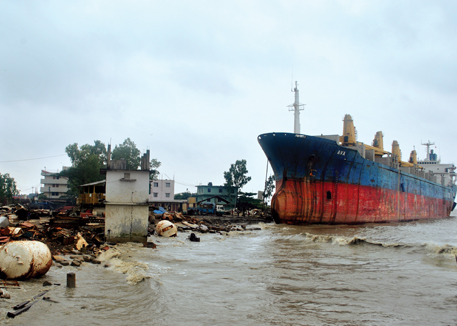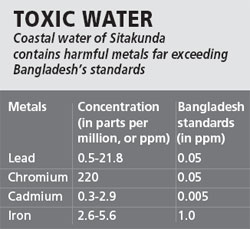Shipbreaking industry, once banned in Bangladesh for
violating environment and safety norms, is back in business

A visit to Sitakunda, the shipbreaking hub of
Bangladesh, does not give an impression that only a few years ago the apex
court of the country had intervened to clean up the hazardous industry
following years of campaign by environmental and human rights groups.
The coastal strip in
Chittagong division remains littered with scrap metals stained with toxic oil
and chemicals; some of the chemicals are carcinogenic. Stories of accidents and
deaths at shipbreaking yards are frequent, but only a few get reported (see
‘Harbour of...’). “Last year, 22 workers died while dismantling ships,” informs
Muhammad Sahin, senior programme manager of non-profit Young Power in Social
Action (YPSA). “This year till July, seven have died and hundreds have been
injured,” he adds.
Ship importing and
breaking activities are on a rise, says Rizwana Hasan, director of Bangladesh
Environmental Lawyers Association (BELA). The non-profit was instrumental in
the supreme court intervention. In 2009, when the supreme court passed its landmark
judgement and directed the environment ministry to immediately take steps to
ensure closure of shipbreaking yards that do not follow environmental norms,
at least 60 yards were dismantling the great hulks, making the industry the
second largest in the world. Thirty-six of them were operating without
clearances, according to an affidavit submitted by the ministry in the court.
The court lifted the ban two-and-a-half years ago. “Now there are nearly 150
yards. About 70 of them are operational,” says Sahin.
Officials with the
Department of Environment (DoE) say all operational shipbreaking yards have
necessary permits but refuse to divulge the number of the total or operational
yards in the country.
Activists refute the
officials’ claim. “The administration has legalised illegal shipbreaking yards
by giving them permits. These yards fulfil only 10 per cent of the conditions
outlined in the environmental clearances,” Hasan alleges.
The court order had
brought a temporary halt to illegal activities in shipbreaking yards, says
Taslima Rahman of BELA. “But in March 2011 the court relaxed the order, which
has allowed the industry to continue its business-as-usual practices,” she
alleges.
When the supreme court
lifted the ban in March 2011, it asked the government to frame rules on
ship-breaking and recyclining within two months. The government followed the
order and drafted the Ship Breaking and Ship Recycling (SBSR) Rules by May that
year. But the rules have not moved beyond the stage of drafting. When asked
about the delay, Habibur Rahman, deputy secretary of the Ministry of Shipping,
told Down To Earth that the SBSR rules “are undergoing a process of review by
several departments”.
Industry lobby at work
Activists allege that
the ship-breaking industry is lobbying hard to delay implementation of the SBSR
rules.
In fact, it is said that
in 2011 the supreme court relaxed its closure order on erring ship-breaking
yards under pressure from the industry.
The ban order had hit
the flourishing industry hard. The Bangladesh Ship Breakers Association had
contested the ban, saying it will have a knock-on effect on the economy. About
30,000 of the country’s poorest are engaged in dismantling of ships at these
yards. Another 400,000 indirectly depend on these yards, like truckers and
scrap sellers, or work with allied industries such as rolling mills. Most of
them have migrated to Sitakunda in search of work at ship-breaking or related
units. The ship breakers association also argued that the ban would cause domestic
steel prices to skyrocket because ship scraps meet more than 50 per cent of the
country’s steel requirement. More than 350 rolling mills use these scraps as
raw materials, according to the Department of Naval Architecture and Marine
Engineering of Bangladesh University of Engineering and Technology in Dhaka.
Since the supreme court
lifted its closure order, shipbreakers have been keeping shipbreaking
activities behind closed doors. This Down To Earth correspondent tried to enter
a shipbreaking yard to find out the working conditions, but was firmly denied.
“The industry has become cautious now,” says Mohammad Idris, who has been
working at the yards since he was 10 and has had close encounters with death
several times while dismantling ships.
Hope in draft rules
The draft rules outline
environmental and occupational safety measures that should be undertaken by
ship recyclers, and impose penalty on defaulters. In case of accidents,
ship-recyclers must report in writing to the police as well as to the Ship
Breaking and Ship Recycling Board (SBSRB) under the Ministry of Industries. In
case of major accidents, the yards can remain suspended for inspection for
seven days. The rules also specify the responsibility of the authorities in
issuing various permits required for shipbreaking.
Officials at DoE say at
present shipbreaking industry is treated like any other industry and ship
breakers have to apply for permits only from DoE and the Ministry of Shipping.
“Under the draft rules, a ship-recycler will have to seek no-objection
certificates from a host of authorities, including SBSRB, Customs Department
and the Department of Explosives. Both DoE and SBSRB will be required to
examine the ship for hazardous wastes,” says Mohammad Shahjahan, director of DoE.
Sitakunda’s long beaches
and perfect slopes make ship beaching easy. This makes the coastal strip a
perfect zone for setting up shipbreaking yards. “Rampant illegal activities in
the yards are earning it a bad name,” admits Zafar Alam, director of the Chittagong
DoE. He hopes the rules will help make the industry hazard free and lucrative.
Harbour of a hazardous
industry
Lax environmental and
occupational health regulations make shipbreaking a lucrative business in
Bangladesh. Cheap labour force, willing to work despite dangerous conditions,
helps it flourish.
Accidents and deaths are
common, says 42-year-old Mohammad Murad. He lost his leg while working in a
shipbreaking yard in 2009. His employer Kabir Steel Yard gave him nothing to
compensate for the loss, he says. Yet, Murad thinks he is more fortunate than
many others. Most often, accidents and deaths go unreported. “Many a time,
bodies of workers are simply dumped into the Bay of Bengal,” says Taslima
Rahman of non-profit Bangladesh Environment Lawyers Association (BELA).
A 2010 World Bank
analysis states, 25 per cent of the accidents and deaths occur when heavy metal
plates fall on workers from the upper decks of the ship. Fire explosion in oil
tankers cause 50 per cent of the accidents and deaths. “Judicial mandates
require a ship to be cleaned of dangerous chemicals before it is dismantled.
But tests done to ensure this are merely obligatory,” says Taslima Rahman of
BELA.
 |
Source: Report ‘National Programme of Action for Protection of Coastal and Marine Environment from Land-Based Activities, 2006’ by the Department of Environment, Ministry of Environment and Forests
|
Occupational safety is
not the only concern for the workers and those living in the coastal area. A
research by University of Chittagong in 2006 shows that polychlorinated
biphenyls, or PCBs, asbestos, lead, chromium, mercury and oil are released when
ships are dismantled, have polluted the water and soil of coastal Chittagong (see
‘Toxic water’). Oil kills marine organisms, while chromium and lead in paint
and batteries cause skin diseases, problems in the gastrointestinal tract,
liver, and damage the brain and kidney. Mercury in lights, fire detectors and
tank-level indicators can lead to mental retardation, disorder of the nervous
system, and delayed neurological and physical development. However, there is
little study to show the impact of pollution on the health of Sitakunda
residents.
Source:
counter currents. By Srestha Banerjee. 17 November 2013
http://www.countercurrents.org/banerjee171113.htm
No comments:
Post a Comment